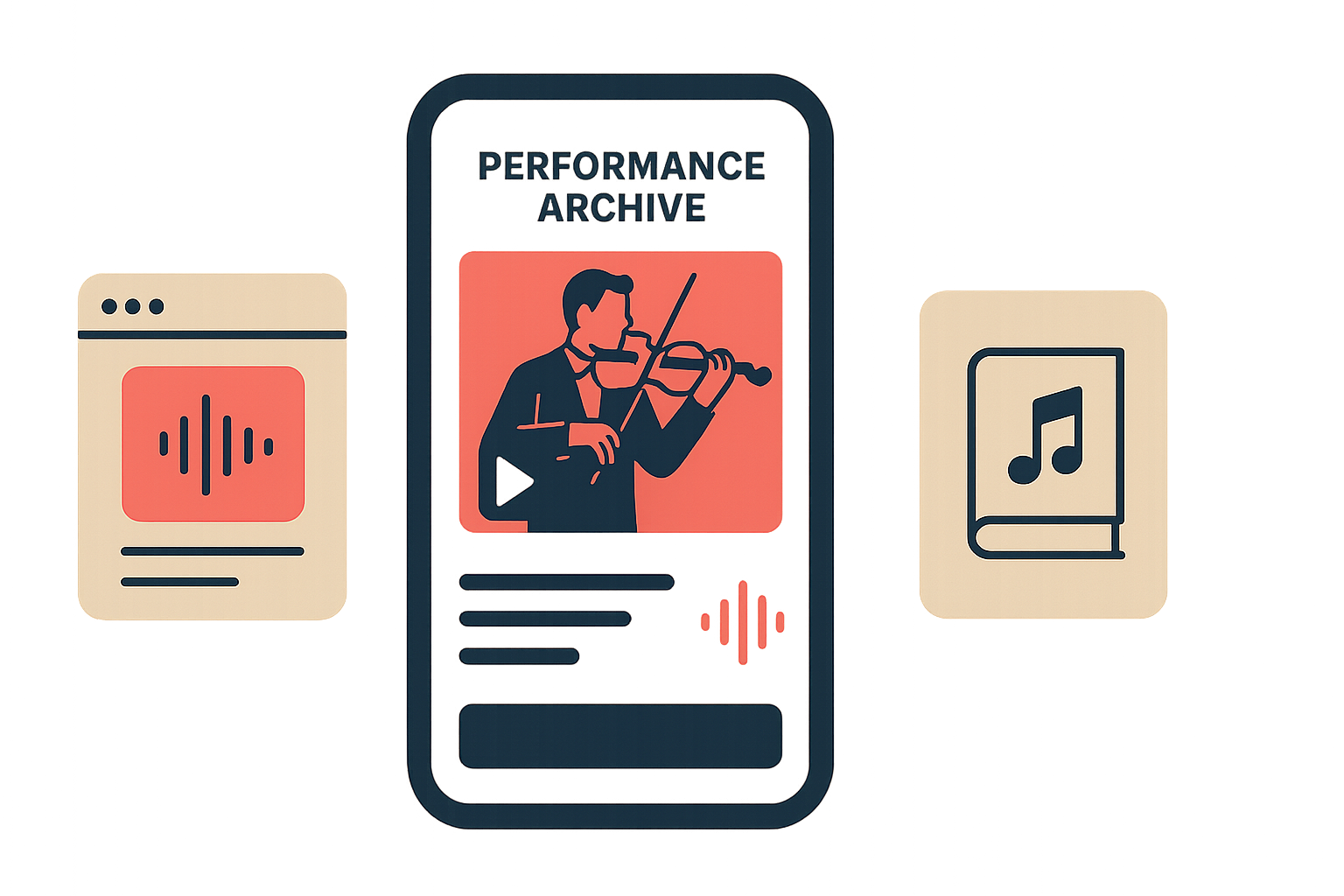The Complete Guide to Building a Classical Music Performance Archive App

Musicians, ensembles, and institutions often face the challenge of keeping their past performances accessible and relevant. A classical music performance archive app provides the solution by preserving and streaming concerts in one centralized digital collection. Instead of spreading recordings across DVDs, CDs, YouTube channels, or hard drives, organizations can build a branded app that holds their complete performance legacy in a sustainable digital format. With Audiorista, a no-code platform for publishing video, audio, and text, it’s possible to create subscription-ready apps tailored to audiences without any coding expertise. This guide explains how to centralize classical recordings, build a digital concert archive, and deliver an engaging branded app experience for fans, students, and cultural organizations.
Why an archive app matters
Classical performances are often recorded in multiple formats and scattered across platforms. DVDs stored in archives, CDs in personal collections, YouTube uploads, or files saved to local hard drives all make it difficult for audiences and institutions to access the full scope of a performer’s or ensemble’s legacy. Without a central repository, recordings risk being lost or fragmented over time.
A classical music performance archive app overcomes this problem by consolidating past concerts in one digital collection. Beyond preservation, a dedicated app creates cultural and educational value by enabling access for research, student learning, and community engagement. For orchestras, conservatories, and independent musicians, archives also function as promotional tools, showcasing professionalism and heritage. With Audiorista acting as a classical music app builder, creators gain a streamlined way to preserve and organize recordings into an accessible, secure, and branded platform.
Building and organizing a digital collection
A digital archive doesn’t just store recordings; it organizes them in ways that audiences can explore meaningfully. Orchestras, conservatories, and ensembles can curate archives based on different criteria, such as composer, period, or performer. These structured approaches allow listeners and students to encounter performances within a thematic, chronological, or academic framework.
With Audiorista, archives can also expand beyond recordings. Musicians and institutions can enrich collections by publishing program notes, essays, and scores alongside performances. This elevates an archive into a multidimensional learning and engagement tool, valuable for students studying performance interpretation, fans deepening their appreciation, and researchers comparing historical recordings.
- Archive by composer, era, or performer
- Add program notes, essays, and scores
- Provide structured access for students and fans
Apps for archiving and streaming
Typical consumer-oriented classical music apps focus on streaming popular works, but they often lack tailored tools for archiving and branding. In contrast, institutions and performers benefit from developing their own application dedicated to their catalog of recordings. By using a white label music app, the archive is fully branded, controlled, and monetized directly by its creator.
With Audiorista, organizations can create your own classical music archive app and launch custom white label music apps with Audiorista. This gives users full ownership, flexible monetization through subscriptions or supporter models, and targeted audience engagement without the limitations of generic consumer streaming apps.
Building without coding
One of the most significant barriers to creating a professional music archive has traditionally been technical complexity. Audiorista eliminates this barrier by offering a no-code environment where creators can manage all aspects of their archive app without programming skills. Musicians and institutions can publish high-quality audio and video alongside text resources, delivering a multimedia experience to audiences.
Beyond access, monetization is seamlessly integrated. Subscriptions, donation-based access, or premium supporter memberships allow orchestras and performers to sustain their operations while engaging audiences. An archive app for musicians built on Audiorista operates as a long-term digital asset, balancing preservation with revenue opportunities and audience interaction.
Streaming for engagement
Today’s audiences expect streaming platforms to be seamless, mobile-friendly, and engaging. Classical listeners also value additional insights into performances, such as rehearsal recordings, behind-the-scenes material, or livestream access. With a branded archive app, performers can integrate these components alongside traditional concert recordings, providing more comprehensive engagement for fans and supporters.
A performer content app creates opportunities beyond basic streaming by offering exclusive material that enhances audience connection. For organizations interested in next-generation solutions, it’s valuable to learn how streaming models are evolving and discover future-ready approaches to audio hosting with Audiorista’s innovations.
Practical uses and final thoughts
- Musicians → Centralize and share recordings
- Educators → Multimedia course archives
- Orchestras → Preserve legacy performances
- Agencies → Showcase client recordings
Start preserving and sharing your classical performances today—build a custom, no-code classical music archive app with Audiorista.


